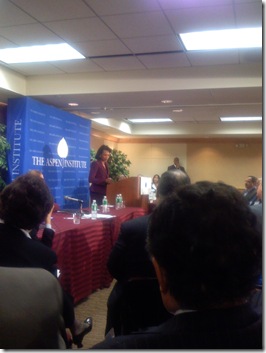I often carry around old newspapers whose op-eds or articles I hadn’t read. Some times I may be dumb enough to bring one copy across half a dozen trips before getting to it, only to realize I was carrying dead weight.
Not just now, when I caught up with last week’s op-ed page from the New York Times, which included an extraordinary piece from Sarah Vowell and a good column from William Kristol.
From Vowell (whose piece goes far beyond the issues covered here), I read about pure Christian theology’s precepts, as taught by Jesus of Nazareth, to "Love your enemies, bless them that curse you, do good to them that hate you." Too bad many followers intoxicated by organized religion’s quest for power forgot this precept.
But Martin Luther King Jr. did not. He applied the Sermon on the Mount in his ‘loving your enemies’ sermon:
So this morning, as I look into your eyes and into the eyes of all of my brothers in Alabama and all over America and over the world, I say to you: ‘I love you. I would rather die than hate you.’
I am a bit embarrassed that I had never heard of this sermon, though I recently went through an experience that made me reflect about similar issues.
Back around late September and early October, when groups that opposed negotiations between Israel and Palestine for a two-state-solution or that did not understand or agree with OneVoice’s mission of mobilizing ordinary citizens to push for an agreement threatened some of our staff and performers, I clumped together attackers and critics, and was overcome with an intense sense of injustice and a hatred that I did not know I had in me.
Postponing the October 18th OneVoice Summit was a painful setback for the team and all our supporters, and it made me feel like I let down so many people and haunted me for a long time (still occasionally now).
Eventually our 18 month campaign not only overcame this setback, but continued to attract support, surpassing 650,000 signatories of the OneVoice Mandate to date, and validating its efforts when the Israeli, Palestinian and American Heads of State committed almost verbatim to the OneVoice Mandate.
But no less important was the internal growth that I experienced during that tough period, when I found myself taking a very wrong path of anger and resentment against those attacking or even just criticizing my team members. Eventually I turned back from that dark alley into a path you can only see from the contrast of the darkness. I felt what it was to hate, and I realized I had to reject it. The experience had a lasting impression and impact on my thoughts about civic activism.
It is not enough to push for the peace process; it is not enough to awaken moderate voices, even though OneVoice recognizes that is tactically the most cost-effective choice to push the process along and highlight there is a partner on both sides. As we gain momentum, we must also truly pursue peace with ALL.
Northern Ireland’s experience is instructive. The movement also started with mainstream grassroots disaffected citizens – Mothers. But eventually it broadened, and it enveloped and involved the leaders from the entrenched militant groups, which were at the table when the deals were struck.
The danger with excluding specific groups and branding them as extremist is that you don’t leave space for the people to evolve in their thought process, but cage them as the enemy, and leave them no other option but to struggle against your vision, which may include the "other", but may exclude some of your own.
Many who believe in a mission of a two state solution think that the only way to get there is to attack those who oppose it, but you end up creating a different type of enemy. Somehow some proponents of peace with the other side have no qualms about fighting with their own.
The journey is as important as the destination. Pursuing peace by demonizing those you consider to oppose it creates a different type of war. Whether it is Israel’s far left which sometimes hates the Israeli right with as much intensity as the Israeli far right hates the Arabs (and the Israeli left), or whether it is someone from Fatah that hates Hamas, or whether it is a Jew who fears or resents a Muslim or vice-versa, all of the paths of hatred must be fought.
As painful as it is to the Israeli left, they need to engage the settlers in a dialogue and welcome them back to the mainstream. This is of course very hard because the settlers are not aching to come in, to say the least, not to mention they want to keep the Israeli left out.
As painful as it is to Palestinian seculars and intellectuals, and to the Fatah power base, they will need to find a way to attract Hamas supporters, many of whom were attracted to the grassroots authenticity of the Hamas movement’s struggle for liberation and turned off by corrupted officials entrenched in power.
And what do you do about those who ideologically cannot reconcile with peace? How do you deal with core Hamas leaders who believe Greater Palestine is an Islamic Waqf (a Trust from the Almighty) which cannot be negotiated away? How do you relate to settlers who feel Greater Israel is a grant to the Jewish people (a Trust from the Almighty), one which cannot be negotiated away?
THESE are the instances where you most must fight all impulses to hate. You must hold on to your principle, and try to reason. But where your reason does not permeate into theirs, you must continue inviting them to come in to your tent one day, and offer that they can reconcile their beliefs with the reality of two peoples destined to co-exist by keeping their spiritual absolutism in their hearts, respectfully, and not forgetting their religious precepts which also require respect and love to other human beings.
It is a very hard thing to achieve an approach of unbending love and respect towards all, and probably only saints like MLK Jr. or Gandhi truly achieve such pure empathy.
After all, when you perceive an injustice to be done, you feel justified, almost morally-bound, to resent the person that commits the injustice. If the injustice is great, you may feel an impulse to hate the aggressor. But I guess you must at least TRY to catch that impulse and fight it. It does NOT mean you don’t fight the injustice; it means you try to get the transgressor to fight it too. And this requires a lot of love.
Otherwise, with so much animosity and pain and fear and suspicions and suffering, it will eat you and turn you into that which you most want to fight.
William Kristol writes about what makes John McCain different from the other Republicans running for their party’s nomination, including being "the not-so-modern type [that is shaped by political consultants, being]…rigid, self-righteous, and moralizing, but (or rather and) manly, courageous, and principled." He tells how McCain memorized as a child, and recited to Kristol on a patchy cell phone call, this extraordinary poem about conviction and courage of the soul:
Out of the night that covers me,
Black as the pit from pole to pole,
I thank whatever gods may be
For my unconquerable soul.
In the fell clutch of circumstance
I have not winced nor cried aloud
Under the bludgeonings of chance
My head is bloody, but unbow’d
Beyond this place of wrath and tears
Looms but the horror of the shade,
And yet the menace of the years
Finds, and shall find me, unafraid.
It matters not how strait the gate,
How charged with punishments the scroll,
I am the master of my fate:
I am the captain of my soul.
-William Ernest Henley, Invictus (1875), as quoted by McCain and told by Kristol, who surmises McCain must have recited this more than once during his captivity as a prisoner of war.
What is remarkable about McCain is that for the most part when I hear him (with the notable exception of his California debate against Romney), he seems to be the captain of his soul and to fight to uphold principles he holds dear, including some times supporting a tough military course without hating his enemy and without doing things out of spite. He too lets people like Romney get the best of him. And it is starkly unattractive. But for the most part, he rises above petty politics. He acts out of nobility and puts US interests ahead of himself or his campaign.

















